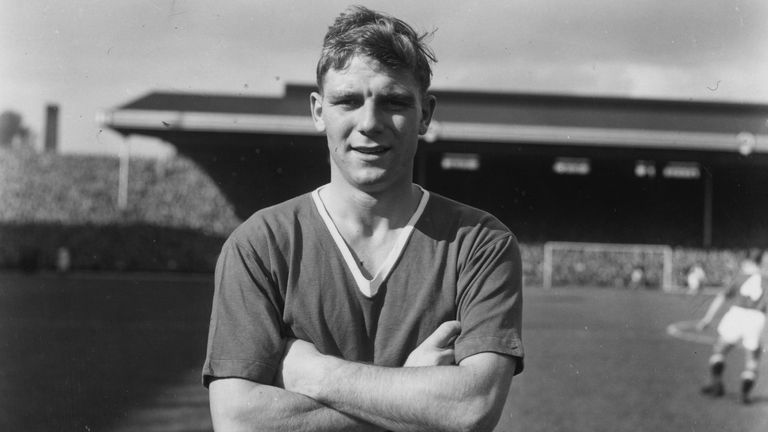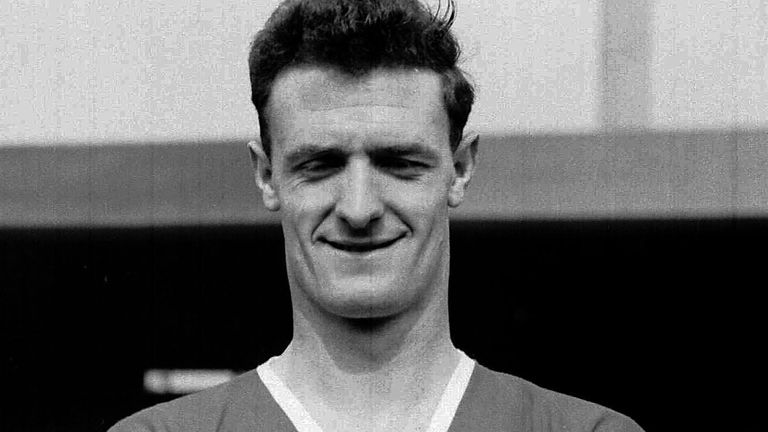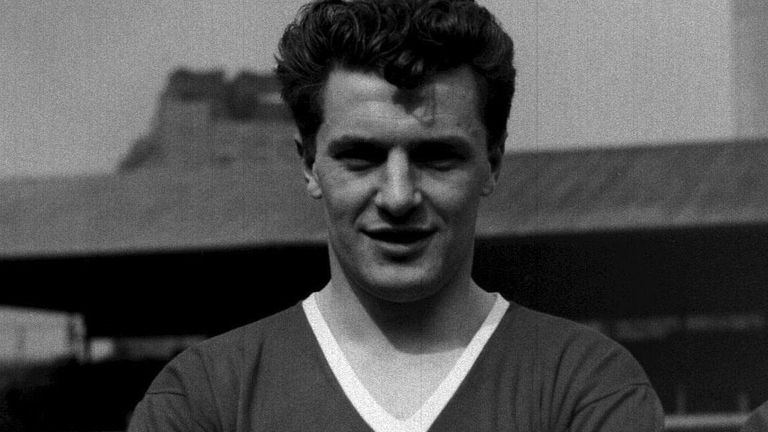Busby Babes: Manchester United's fallen eight remembered
Friday 5 February 2021 09:51, UK
On the 63rd anniversary of the Munich air disaster, we look at the stories behind the eight members of Manchester United's Busby Babes who tragically lost their lives.
On February 6 1958, Manchester United's players were returning from Belgrade, where they had just knocked Red Star Belgrade out of the European Cup to advance to the semi-finals, with this bunch of immensely talented young players tipped to go all the way and become the first British team to win a European trophy.
Tragically, however, after stopping to refuel in Munich, the plane carrying the United team, staff and journalists crashed on its third attempt to take off from a a slush-covered runway, resulting in 23 fatalities with 21 survivors.
Manager Matt Busby survived after lengthily hospital treatment, but eight players lost their lives. 63 years on, with the help of United museum tour guide John Quinn, we look at the stories behind the players whose lives were cut so cruelly short.
Duncan Edwards - 150 appearances, 20 goals, died aged 21
The most famous of the eight, Duncan Edwards made his first-team debut at 16, which at that time was unheard of. The average age of a top-flight footballer at that time was around 26, but United's was 21 and Edwards brought that down further. He debuted for England at 18, and was the youngest player to play for his country until Michael Owen came along.
People always ask the question "was Edwards as good as everyone says he was?" All you have to do is refer to Bobby Charlton's answer to really gauge Edwards' talent, as Charlton labelled Edwards the best player that he played with - high acclaim given Charlton starred alongside George Best and Dennis Law later.
Size, speed, strength, and eye for goal, Edwards could literally play anywhere on the pitch. He was known as a midfielder, but he frequently dropped into defence, and could easily play up front. Think Roy Keane, Steven Gerrard and Frank Lampard, roll them all into one, and you might get close.
Tommy Taylor - 191 appearances, 131 goals, died aged 26
Tommy Taylor was a record signing at the time, but there was real quirk to this, as he signed for £29,999, because Matt Busby did not want him to be the first £30,000 footballer, given all the pressure that would come with that. He was the big name in the squad.
The interesting thing about Taylor is just how many goals he actually scored. Taylor played 191 games for United, and scored 131 goals. Statistically, the only person that can comes near that kind of goals-to-games return for United is Ruud van Nistelrooy. The story goes that United were looking for a defender, and Busby sent his assistant Jimmy Murphy to Barnsley to watch this defender after hearing so many reports about him. Murphy, within minutes, only had eyes for Taylor, and reported back to Busby that it was the centre forward who needed signing.
Roger Byrne - 245 appearances, 17 goals, died aged 28
United's captain was regarded by Matt Busby as a really stylish footballer, calling him the "aristocracy of football". Roger Byrne started out as an attacking player before moving into defence, making his name as a full-back. He oozed class in every way, in any position he played in. He actually won 33 consecutive England caps, which at that time really was an amazing achievement.
The terribly tragic thing about Byrne was that his wife was pregnant with their first child, but he did not know, as she planned to tell him when he got back from Belgrade.
Billy Whelan - 98 appearances, 53 goals, died aged 22
From north Dublin, Billy Whelan played for a team in the city called Home Farm, and even to this day, Home Farm are renowned for producing star players. The scouting system at United had moved into Ireland and Northern Ireland after the war, and Whelan was heavily scouted before he signed.
Whelan came from a very large, close family, and after joining United, he really suffered with homesickness. In those days, without frequent air travel, Dublin and Manchester were far apart. Once he got into Busby's system at United, he found a second home. He played 98 games for United, scoring 53 goals, which for a 22-year-old, a long way from home, was incredible. Positionally, he was like a modern day No 10.
Eddie Colman - 85 appearances, 1 goal, died aged 21
Eddie Colman was the youngest of the players who died, by a few months, at just 21. He was from Salford, down the road from Old Trafford, and won three FA Youth Cups. Coleman was the prime example of the incredible youth policy at United that was revamped after World War II - the local boy made good.
To describe his position in today's terms, you would say he was midfielder. Known as "snake hips" Colman was tremendously skilful, with a low centre of gravity. He was not the biggest player, but played alongside Duncan Edwards, who was a giant. They complemented each other so well, like Roy Keane and Paul Scholes did much later on.
Mark Jones - 103 appearances, 1 goal, died aged 21
One of three Yorkshiremen to lose their lives at Munich, Mark Jones had the benefit of coming through the entire youth system at United, coming to the club as an amateur at the age of 15, in 1949, another of these vibrant young players Matt Busby was determined to bring to the club.
Jones was a tough central defender who won two league titles at United, and he did establish himself in the team, but it was no easy ride, because right in front of him in the pecking order was the more established Jackie Blanchflower, who survived Munich. Jones worked hard to displace Blanchflower, and had done by 1958, with Blanchflower travelling to Belgrade as cover for Jones.
David Pegg - 127 appearances, 24 goals, died aged 22
United scouted David Pegg through the Doncaster school system, which back then was a real goldmine for United and had a real influence on the team. He only had one England cap, but had just broken into the setup before Munich.
Often Pegg is described as a dashing left winger, which immediately draws comparison to Ryan Giggs. Matt Busby himself described him as a great asset to any team, to be able to have such a talented left-footed player, who was really clever and used the ball so well. He was regarded as the best winger at the club by some margin - lots of panache, skill and trickery.
Geoff Bent - 12 appearances, 1 goal, died aged 25
Geoff Bent was always the unlucky player. Jimmy Murphy was always happy to have him at United, but they could not always find a place in the team for him, as he played in the same position as Roger Byrne, and Byrne was untouchable.
Bent had the mentality to be patient and help the team out when he was called upon. He only played 12 times for United, but was a huge fan of the club. He was a great tackler and a huge physical presence. United were lucky to have a player so loyal and happy to fill in when needed.
The Munich air disaster claimed the lives of 15 others:
Captain Kenneth Rayment, co-pilot
Tom Cable, cabin steward
Walter Crickmer, Manchester United club secretary
Tom Curry, Manchester United trainer
Bert Whalley, Manchester United chief coach
Frank Swift, News of the World and former Manchester City goalkeeper
Alf Clarke, Manchester Evening Chronicle
Donny Davies, Manchester Guardian
George Follows, The Daily Herald
Tom Jackson, Manchester Evening News
Archie Ledbrooke, The Daily Mirror
Henry Rose, The Daily Express
Eric Thompson, The Daily Mail
Bela Miklos, travel agent
Willie Satinoff, Manchester United supporter and close friend of Matt Busby










